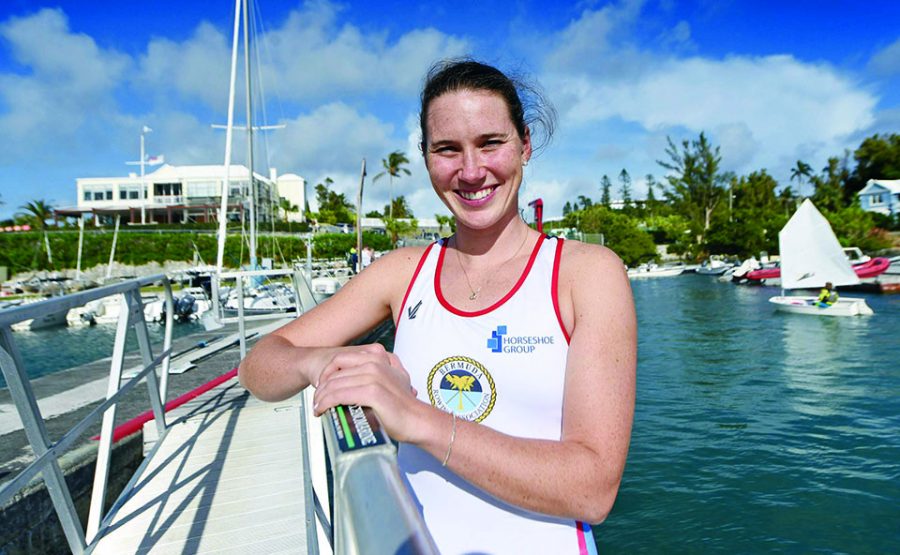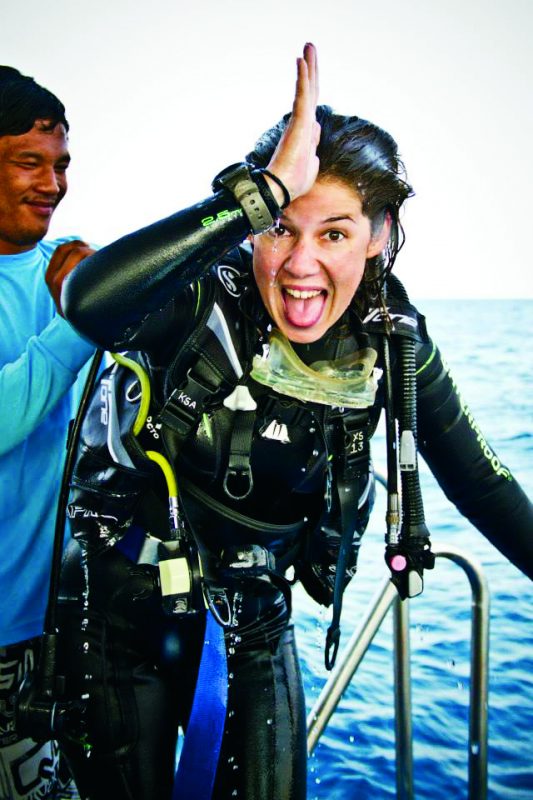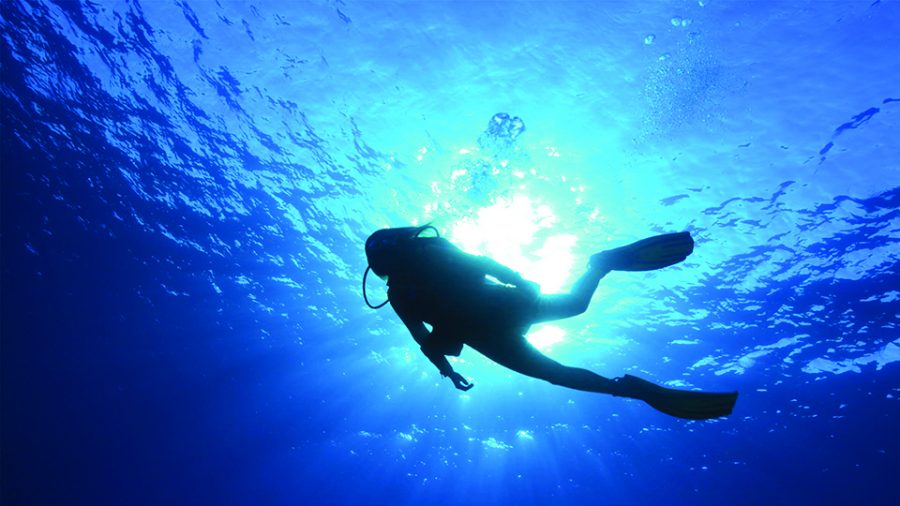Bermuda athletes, Ashley Yearwood, Shelley Pearson, and Marlee Cramm talk about leading the way for women in their industries, and how sports helped them to get through girlhood.
Ashley Yearwood: Shelley, the rower, Marlee, the scuba diver, world travelers, you both spend most of your time on/in the water, but [Marlee] many people wouldn’t classify scuba diving as a sport. Is it?
Marlee Cramm: It’sactually considered an extremesport, because of the equipment that’s used, and the high pressure. It’s not necessarily competitive like rowing. Scuba diving is just for yourself. You’re just focusing on the view, on your breathing, it’s very Zen, very meditative.
AY: Shelley, can you relate?

Shelley Pearson: The Zen part of it, yeah. That’s an aspect that you find when you’re racing in a single boat (as opposed to a team boat). There are moments in a single when you’re out on a dead flat day. All you hear is the sound of the water under the boat, and you fall into a rhythm. At that point, you’re doing it for you. One other common thing between rowing and scuba diving is that women can excel at, it’s something that we can do well, and we can compete against men if we want to.
AY: For the women’s issue, that’s obviously what we want to talk about. First, can you tell us what “girlhood” is to you?
MC: I feel like [girlhood] is something very unique to a time. I’d say girlhood is fleeting, and precious and something I wasn’t aware of until I got much older.
SP:I agree with that. “Girlhood” makes me think back to a time when I didn’t know “being a girl” meant anything different from “being a boy”. I had a younger brother and I could do anything he could do, or better. At the time when adults are comparing “boyhood” vs. “girlhood”, kids are feeling equal. It’s an important concept to reflect on because there’s a lot more that talks to boyhood then what it means to be a young girl. You spend most of that time trying to find your way through.
AY: For me, swimming helped with that. It made me much more self-aware in my mind and my body as I started to grow up. Did sports play a role in moving from girlhood to womanhood?

MC: I remember I was about 13 when I stopped reading girl magazines. They were just so untrue, what they were wearing and how [the girls] were all the same shape. When I started working in dive gear, I realized that no one looked the same. That made me feel far more comfortable with my body. I definitely learned to look past the surface. That’s one of the best things about diving is that you can look any particular way, it doesn’t make you a better diver.
SP: Yeah, absolutely. I was always very tall, and rowing actually celebrates tall, strong girls –– everyone in that world is 5’8 and up. Also, I’ve been able to watch women in and out of the sport grow to be incredibly successful in their lives. It has shaped how I see myself in the world, and has given me confidence.
AY:Serena Williams once said, “I always felt like I had to be softer or apologize, kind of indirectly, for who I am. And I don’t know when it happened, but something changed.” What comes to mind when you hear that?
MC: I find that when I’m asking men to do something, I tend to say “please” a lot, when I should just be able to say, “Go and do this”. Turning 30 and having the experience of running the Women’s Dive Day for PADI in Bermuda gave me the courage to say, “No. I don’t have to be passive or apologetic for being a woman in charge.”
SP:There’s this horrible saying in my sport that says, “Rowing turns men into gods, and women into men”. When you’re in athletics at my level, you’re aggressive in a way that’s not necessarily considered “feminine”. Women in sport think more about the faces they make or the way their unisuits look, things that men don’t think about. When I hear [Serena’s] quote, I think about the physical aspect of sport, “Am I smiling and girly, or am I aggressive and an athlete?”
AY: Speaking of how you look when you’re doing your sport, since both of you wear water suits, have a look at this swim suit from 10 years ago, and one from now. What do you think?
MC: Whoa, I think it’s a bit over kill, for me wearing a wetsuit is about comfort, something I can be in all day because it’s my work uniform. People wear ties to work, I wear a swimsuit. Diving is not pretty –– you come up and your hair is everywhere, you’ve probably got snot on your face. Trying to make a sport pretty for the sake of being a woman is just ridiculous.SP: In rowing, unisuits aren’t flattering on anyone, but if young girls feel like they need to look pretty while they are working out, it takes away some ofthe raw naturalness of the sport. Sport is about giving it everything that you have. You don’t want to be thinking about what you look like while you’re giving it everything you have.
AY: It’s interesting, though, that men’s bathing suits haven’t changed in years; that people think more about what women should wear in sport versus men.
SP: There’s been a general trend in women’s workout clothing in general, it’s become more of a way to look “sexy” while working out.
M: Why do we have to look sexy though, why is that pressure on us? I don’t think it’s women putting the pressure on each other.
S: It really should be about what’s practical.
AY: In thinking of all the experiences that you’ve had, being a woman, being a girl, being in sports, being out of sports, being in the world, what would you tell your younger self to get her through girlhood?
MP:Don’t be scared to be confident. You don’t have to be soft and gentle to be a woman, and you have every right to be in charge. Be as strong as you can be, because a lot of young women are looking at you. Be that leader for them. You don’t have to stand behind a male instructor to be valuable. You are valuable.
SP:Definitely the “valuable” thing. I struggled for a long time as a young girl being so tall and so competitive and trying to fit in that I guess I would tell my younger self that “it’s okay. You will find the people who will bring out the best in you. It’s hard right now, it’s hard for everyone right now, but you will find your people. You just have to wait.”
AY: I still feel like I’m a girl, so I wouldn’t be able to answer that question yet.
SP:My Olympics coach hated using the word “girl”. Society calls the men “men”, and us “girls”, and she would always say, “You are independent, confident women!” It’s interesting because in sports, the word “girl” is used a lot longer than “boys”, and it really shapes the way that you think about women’s sports.
MC: I don’t ever use the word “girl” in diving, I use “ladies”.
SP:I love that. I love “ladies”.
MC:Yeah, “Alright ladies, let’s go!”
AY: Well, thank you guys, women, ladies, for coming in and sharing your thoughts on girlhood and sport. You’ve been incredible.
This article was originally published in the Fall 2018 edition of RG Magazine.

